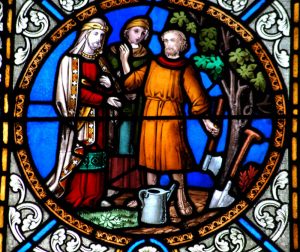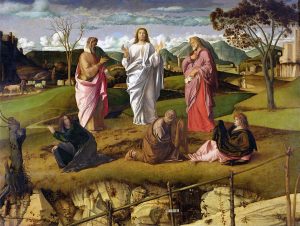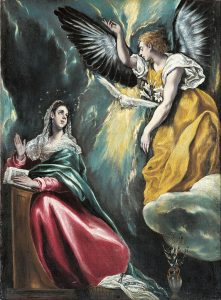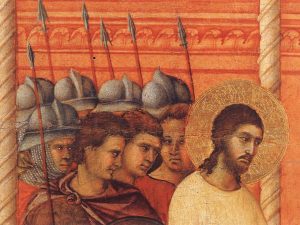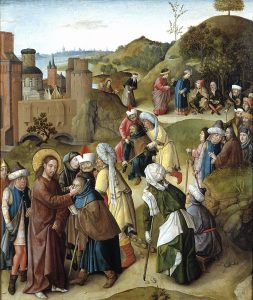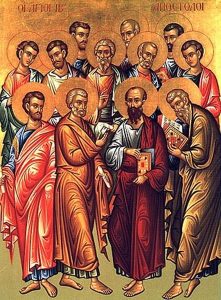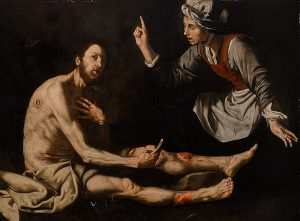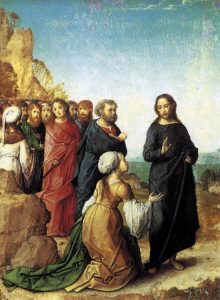Illuminations on the Lectionary readings for June 19, 2022 (Pentecost 2C)
First Reading (Track One): 1 Kings 19:1-15
The long season after Pentecost with its green vestments and altar colors now begins. In the past six months we have marked the incarnation, death, and resurrection of Jesus. Now we begin almost six months of following the life and works of Jesus as told by Luke.
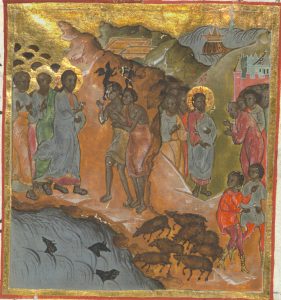
Jesus, the Gerasene, and the Unclean Spirits (1594), book plate by Luke the Cypriot (active 1583-1625). Walters Art Museum, Baltimore. (Click image to enlarge.)
Our Track One first readings during this season will draw from the prophets of the Hebrew bible. We begin with Elijah, a bold prophet who fought the priests of Baal and spoke truth to King Ahab and his wife, Jezebel. In this reading we find Elijah fleeing an angry Jezebel’s revenge, worn down and afraid. Fighting despair, he hides under a broom tree and begs God to take his life. But God has other plans, and sends winds, an earthquake and fire to get Elijah back to God’s work.
First Reading (Track One): Isaiah 65:1-9
We now return to the long season after Pentecost. Although this was once called “ordinary time,” we should not think of it as a less important liturgical season than the Incarnation at Christmas or the Resurrection at Easter: Now the life and works of Jesus come to the fore. In our Track Two first reading we are close to the end of Isaiah’s long book of prophecy. The prophet has called on God to withhold anger, even though the people have broken the covenant and behaved badly. God responds: Those who have been rebellious, who have provoked God’s anger, earned punishment. But that punishment will be just and righteous: “I will do for my servants’ sake, and not destroy them all.” A remnant will remain to inherit Zion, God’s holy hill.
Psalm (Track One): Psalm 42 and 43
In two Psalms in sequence we hear poetic language, filled with lamentation but ending in hope and faith. The Psalmist’s soul longs for God as a deer longs for water. His soul thirsts for God. But when faith falters, the Psalmist asks over and over why God has forgotten him. Finally faith wins as he begs God to send out God’s light and truth, and lead him to God’s holy hill.
Psalm (Track Two): Psalm 22:18-27
In praiseful phrases that sound a distant echo to God’s response to Isaiah’s plea, this passage from Psalm 22 calls on God to stay close to the people, to protect them from danger, from the sword and from wild animals. All the congregation, praise the Lord, the Psalmist prays: Let Israel stand in awe of God and know that God works justice and righteousness for all who seek and praise God, particularly the hungry poor who come seeking protection and food.
Second Reading: Galatians 3:23-29
In this beautifully worded letter to the predominantly Gentile Christian community of Galatia, near what is now Ankara, Turkey, Paul makes a strong plea: You Gentiles are welcome in this young but growing church. You need not strictly follow the laws of Judaism. You need not keep kosher nor be circumcised. Gentiles are in no way second-class Christians, Paul proclaims, in beautiful, inclusive language that echoes through the ages: There is no longer Jew or Greek, there is no longer slave or free, there is no longer male and female; for all of us are one in Jesus. All are heirs to God’s covenant with Abraham.
Gospel: Luke 8:26-39
This passage from Luke’s Gospel must have made its original audience laugh, with its allusions to the hated Roman army in the name of the demon, “Legion,” residing in a naked man living among tombs with swine, a litany of conditions that they would have considered unclean. When Jesus begins a conversation with the demons, they bargain with him, asking to be cast into the swine, which then charge into the sea and drown. This obviously does not sit well with the herd of swine’s owners, who ask Jesus to go away. And then the now-healed man wants to follow Jesus, but Jesus tells him to go back to his people instead and tell them what God has done. What’s going on in this strange story? Perhaps Luke wants us to see clearly, as Paul did in Galatians, that God’s love is unlimited and available to all.

